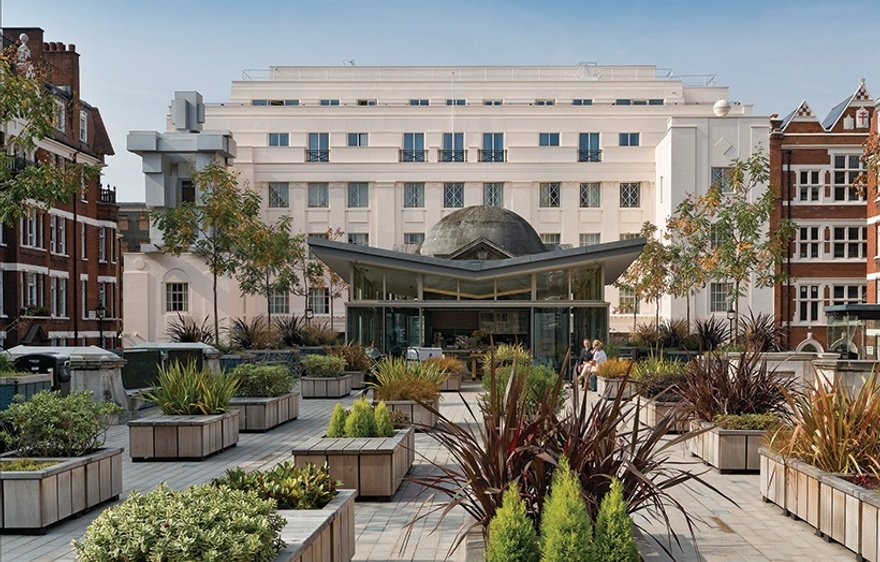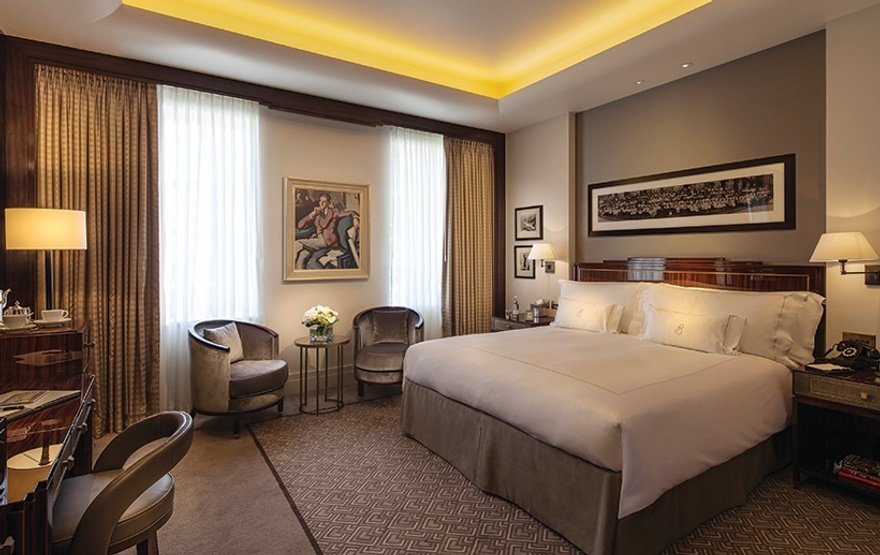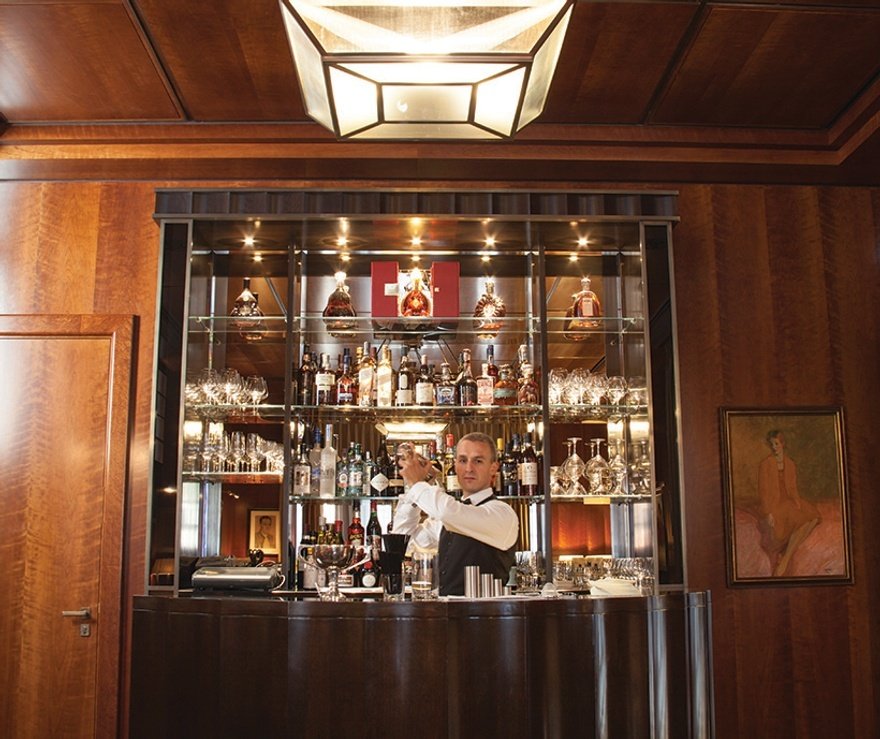The general manager of the Beaumont hotel in London's Mayfair spoke to Rosalind Mullen about the difficulties of bringing tourists back to the London luxury hotel market.
Tell us a bit about the W1 Group.
It's a group of 29 five-star hotels in the centre of London. I'm the chairman, not the spokesman, but all the hotel owners share similar worries. It has been great how we have supported each other during this time – we've all been trying to save jobs and keep our teams together. By September most hotels in the group will be open, but the Beaumont has not confirmed an opening date yet.
You closed the Beaumont on 23 March. Did you ever imagine you would still be closed at the end of the summer with no opening date confirmed?
Not at all. In 2019 we ended at 92% occupancy and it came to a sudden stop for all of us. I made sense of the closure at the time by planning what we would do to prepare for reopening. I still have more or less the same plans, but I haven't confirmed an opening date as demand just doesn't justify it yet. I'm keeping a sharp eye on that, but at the moment many European countries are going in the wrong direction, with Switzerland, France and Spain all now on the quarantine list – along with our main market the US, and many others.
So, along with other hotels in the capital, fallout from the stop-start quarantine measures directly affects you?
Yes, some 85% of our clients are international travellers, so if they have to quarantine, or don't feel comfortable about coming to London, that takes a lot of our customer base away. Our main feeder market is North America, with more than 50% of our guests. Then it's Europe, South America, Mexico, Australia. We have a lower percentage of Middle Eastern guests. Many visitors are not willing or able to quarantine for two weeks, but London is not in a different situation to other cities such as Paris, Rome and Madrid. People are choosing hotels with space and fresh air rather than cities.
Is the problem in London confined to five-star hotels?
I don't know comparative figures, but I would say this crisis is a problem of demand, not price. It's more to do with location than stars. Hotels outside London have done much better in the summer months.
Yes, according to analyst STR's figures, rural hotels are benefiting from the staycation boom, while London hotels are seeing the lowest occupation in the country with an average of 37% – some even at 10% or less. What else, besides the quarantine issue, is keeping visitors away?
I'm really pleased about the success of the rural and coastal hotels. The problem in London is that many attractions such as theatres, live events, some museums and even some restaurants are still not fully open, so several of the main reasons why people come to the capital are not here yet. Footfall in the West End is down 60% on the same time last year.
I wouldn't know who to open the Beaumont to at the moment. We are monitoring it and have retained our team. They are what matters most, though we are down to 165 employees from 185, as several have gone back to their home countries. According to the World Travel and Tourism Council's most recent data, in 2018 international visitors accounted for 85% of all tourism spending in London. VisitBritain estimates the drop in London's international tourism spend will be £12b.
What do you believe the government needs to do to bring visitors back?
First, being a government official during Covid must be difficult, because nobody has been around a pandemic of this scale before. But I feel strongly that the government has not taken a strong leadership position. There are too many guidelines and too few rules, which has created uncertainty for those running businesses and uncertainty for visitors, too.
For example, in some shops you have to wear facemasks, but in others you go in wearing a mask and the manager walks past without one. It's the same in restaurants – you can walk into one and it's like a hospital, but in another nothing has changed. It creates inconsistency and so the traveller wanting to visit London feels confused and insecure. In Italy, for instance, almost everyone wears a mask at all times.
It is left to the industry to figure it out. Hospitality is made up of independent businesses and if they are only offered guidelines each one will make different decisions, so people shouldn't blame the industry for not being consistent.
I think people long to come back to the great, iconic hotels that London offers – it is my favourite market in the world – but people need to feel safe about coming here. They need to know that the UK is managing the situation.
How can the government make people feel confident to travel here?
We need to show we're open for business and safe for all ages. Covid-19 is here to stay, so we need to find a way to live with it. We need more defined and enforced rules on masks, PPE, social distancing and gatherings, and we urgently need the introduction of an effective, rapid test and trace programme at ports of entry. If you enforce that and take away the need to quarantine, it could bring back the traveller and create a feeling of confidence. And this isn't just my view – it is scientists who widely recommend wearing masks and the implementation of test and trace. And I believe them.
Has the government gone far enough to support hospitality businesses?
First, I want to acknowledge the work of UKHospitality chief executive Kate Nicholls and her team, because they have done a fantastic job of lobbying the government and, as a result, the amount of attention hospitality has got at government level has been great. At the W1 Group we've worked closely with her team these past months.
What the government and the chancellor Rishi Sunak has done with the VAT cap, the employment support scheme and the business rates holiday is great, and these measures saved a lot of jobs, but now it is necessary to recognise that this crisis is not over and that the industry needs continued support.
Within W1, the general consensus for November is that occupancies will reach at best 35% after the even slower months of September and October.
Financial pressure is not easing for a lot of businesses – in fact, it is getting worse for many – so we need an extension on these benefits. Yes, some businesses in the countryside have performed better, but that is not guaranteed during the winter months. Demand for our hotels in London has not changed, but the support is ending. This will again put many jobs in jeopardy and this industry is a big employer [representing 10% of UK employment].
Similarly, Eat Out to Help Out generated 100 million meals – it's another scheme that is successful and has now been stopped. During the good weather many hospitality operations in the capital were able to make use of outdoor space, but we're coming into winter and will be indoor-bound again, so targeted support is vital for as long as it is needed.
We need to manage the crisis and live with it because obviously no government can keep paying businesses in replacement of tourism. It will always be a band aid, but at the same time the band aid can't be ripped off too quickly. When we start to attract big numbers of travellers back to London, then businesses can self-sustain, but otherwise it looks very challenging.
Latest estimates show that only 30% of British office workers are back at their desks, further starving the hospitality, retail, hospitality, culture and leisure sectors of customers. To generate business, mayor of London Sadiq Khan has urged the government to extend furlough for those industries. This must be a relief to hear?
We are grateful to have the mayor's support here, yet he reimposed and increased the congestion charge during a time when visitors to the city and the return of office workers are crucial to help the recovery of hospitality businesses. There are no easy answers, but still many questions.
We face a lack of confidence and mixed messages around public transport and, as long as the guidelines about travelling with a mask on public transport remain vague and inconsistent, it is hard to persuade people that it is safe – half of people on the bus don't wear a mask, for example. Unless you get people back on public transport and working in cities, you won't get the recovery of restaurants and pubs.
How will London attract international visitors if not all the shops, theatres, museums and restaurants are open?
That is a really important point because intrinsically, hotels, restaurants, shops, museums and theatres all depend on each other for our success.
As the chair of the W1 Group, I have been on regular calls with UKHospitality, VisitBritain and other key industry leaders and we have been co-ordinating efforts and lobbying on behalf of the tourism industries. The Beaumont is a member of the New West End Company, which also continues to do great work to strengthen the West End and Mayfair as a leisure and shopping destination.
Business events and conferences are worth £32.6b to the UK economy. The government has now launched pilot events to test and refine protocols for their potential safe reopening from 1 October. But how has the lack of clarity around meetings and events in recent months affected London hotels?
It has been a big grey area. You can now hold weddings or events for up to 30 people, but larger events in particular are key revenue and profitability drivers for a lot of London hotels and many have millions of pounds of events revenue still at risk before the year ends. Some events bookers have postponed until 2021, but with Christmas coming there are still a significant amount of bookings for quarter four that need protecting, with clear guidelines and support.
It is good news that following representations from UKHospitality, the pilots will include private dining functions and gala dinners, which will feed into final decisions taken in mid-September.
If London is not getting international visitors, is there scope to attract more Brits?
A number of hotels are efficient at marketing their F&B by offering delivery services to locals in lockdown and redesigning their restaurants for outdoor dining, and this will for sure increase their local following in the future.
With the weather turning and the beach holding less appeal, there is potentially more traction to come back to the city. There is a real opportunity that can't be missed to promote the city as a destination for autumn and winter, but safety needs to be promoted, too. If we are able to market and promote a safe environment with a clear message of behaviour, people will come back to the city.
What level of marketing have you been doing during your closure?
We've been keeping in touch with our regular guests and luxury travel advisers. Everyone is looking for assurances that the world they know will not have changed beyond recognition. They are seeking familiarity.
Personal attention is key. When guests come back to the Beaumont they want to be welcomed by people they know. Luxury is about trust and the personal touch and many of our staff have been here a long time and have strong relationships with guests.
We always say it is ‘one guest at a time', and during this crisis we've continued that ethos by interacting on a one-to-one basis rather than sending out a mass email. We've contacted them to see how they're doing and how their families are, and it is heart-warming how many messages and photos we shoot back and forth. Our relationships have become stronger. Guests are emotionally attached to this hotel.
Another key to success is the important relationships we have with luxury travel advisers and the large travel consortia, such as Virtuoso and Signature. During this crisis, they've done a lot of work to support us and our shared clients. This crisis will strengthen the role of the travel adviser. Travellers were burnt at the beginning by complicated cancellation policies and as they look for reassurances and are possibly more risk-averse, the role of the travel adviser will become increasingly important.
Are we in danger of focusing too much on the Covid-19 risk to the detriment of other important issues?
Sustainability is close to my heart and there is a real risk of it being put on hold. In lockdown we have seen a lot of use of plastic and single-use items. Covid is a real threat, but it will pass; climate change is the real threat to our industry in the future so we must act now.
Continue reading
You need to be a premium member to view this. Subscribe from just 99p per week.
Already subscribed? Log In








